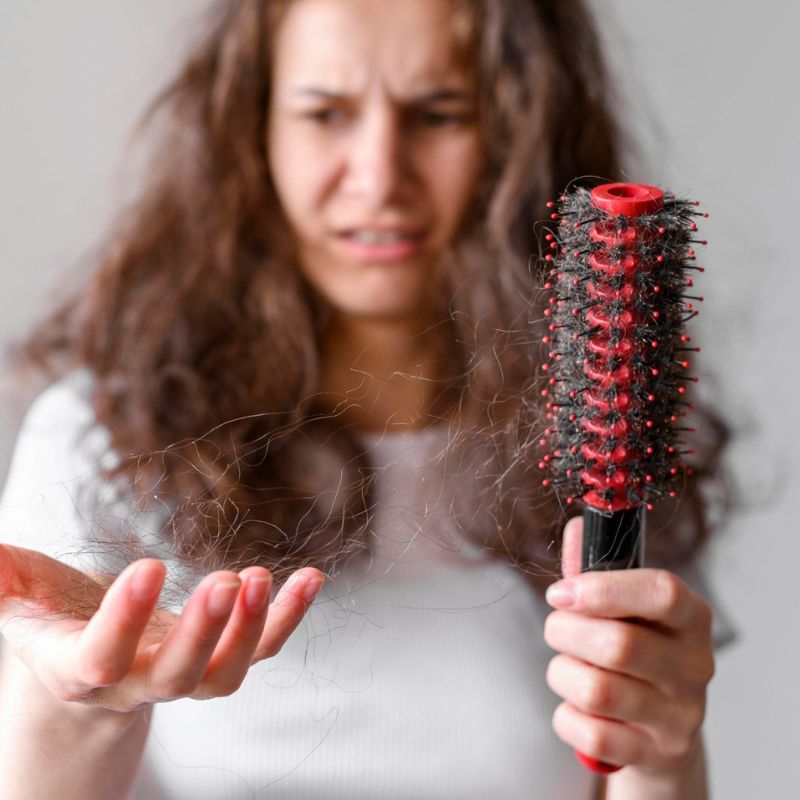Ayurvedic Medicine and Treatment in Indore for Hair Diseases
Hair is often considered one of the most significant aspects of a person’s appearance, contributing to self-confidence and identity. However, hair diseases can disrupt this harmony, leading to various issues such as hair loss, dandruff, and more. In this comprehensive guide, we will delve into the world of hair diseases, exploring what they are, their causes, symptoms, and how Ayurvedic treatments can provide a holistic solution for these conditions.
What are Hair Diseases?
Hair diseases, or hair disorders, encompass a broad spectrum of conditions that affect the scalp and hair. These conditions can manifest in various ways, including hair loss, excessive hair growth, scalp inflammation, and structural abnormalities of the hair shaft. Understanding these disorders is crucial for timely diagnosis and treatment.

Causes of Hair Diseases:
The causes of hair diseases are diverse and may include a combination of genetic, environmental, and lifestyle factors. Here are some common underlying causes:
- Genetics: Many hair diseases have a genetic component. Conditions like androgenetic alopecia (pattern baldness) tend to run in families.
- Hormonal Imbalances: Fluctuations in hormonal levels, particularly androgens (male hormones), can lead to various hair disorders, including hirsutism (excessive hair growth) and hair loss.
- Autoimmune Disorders: Conditions such as alopecia areata result from the immune system mistakenly attacking hair follicles, leading to hair loss.
- Infections: Bacterial, fungal, or parasitic infections can affect the scalp, leading to issues like folliculitis or tinea capitis.
- Inflammatory Skin Conditions: Scalp conditions like psoriasis and seborrheic dermatitis can result in red, itchy, and scaly patches, often accompanied by dandruff.
- Stress: High levels of emotional or physical stress can trigger a condition called telogen effluvium, causing temporary hair shedding.
- Medications: Some drugs and treatments, such as chemotherapy, can lead to hair loss as a side effect.
- Nutritional Deficiencies: Inadequate intake of essential nutrients, particularly iron, biotin, and zinc, can contribute to hair diseases.
- Environmental Factors: Exposure to harsh environmental conditions, pollution, and excessive use of hair products can damage hair and the scalp.
Symptoms of Hair Diseases:
The symptoms of hair diseases can vary widely depending on the specific condition. Here are some common symptoms associated with different hair disorders:
- Hair Loss (Alopecia): This can manifest as gradual thinning, bald patches, or complete loss of hair in affected areas. Androgenetic alopecia often results in a receding hairline and thinning at the crown.
- Dandruff: Symptoms include white or yellow flakes on the scalp, itching, and a feeling of tightness or discomfort.
- Hair Thinning: Hair becomes visibly thinner, lacking volume and density. It may break easily and appear lifeless.
- Itchy Scalp: Persistent itching of the scalp can be a symptom of various conditions, including psoriasis and fungal infections.
- Scalp Redness: Conditions like seborrheic dermatitis can cause red, inflamed areas on the scalp.
- Excessive Hair Growth: Conditions like hirsutism lead to the development of thick, coarse, and dark hair in areas where men typically have hair, such as the face, chest, and back.
- Hair Knots or Beading: Conditions like trichorrhexis nodosa can cause hair shafts to become brittle and form knots or beads.
- Flaking or Scaling: Scalp conditions, including psoriasis and seborrheic dermatitis, may result in flaking or scaling of the skin.
Some of the most common and major types of Hair Problems
- Hair Loss (Alopecia)
- Dandruff
- Hair Thinning
- Hair Louse
- Psoriasis
Hair Loss (Alopecia):
- Hair loss, or alopecia, refers to the loss of hair from the scalp or other parts of the body. There are various types of alopecia, including androgenetic alopecia (pattern baldness), alopecia areata (an autoimmune disorder causing bald patches), and telogen effluvium (temporary shedding due to stress or other factors).
- Hair loss can result from genetics, hormonal imbalances, medical conditions, and more. Treatment options range from medications to lifestyle changes, depending on the underlying cause.
Ayurvedic Treatment in Indore for Hair Loss
- Ayurvedic Oils: Regular scalp massages with Ayurvedic oils like Bhringraj oil, Amla oil, or Brahmi oil can stimulate circulation, nourish hair follicles, and promote hair growth.
- Herbal Supplements: Herbs like Amla, Bhringraj, and Ashwagandha may be recommended to support hair health.
Dandruff:
- Dandruff is a common scalp condition characterized by the shedding of small, white, or yellowish flakes of dead skin from the scalp. It is often accompanied by itching and a feeling of tightness.
- Dandruff can result from various factors, including an overgrowth of a yeast-like fungus on the scalp. It can typically be managed with over-the-counter ayurvedic shampoos containing antifungal agents or by adjusting hair care routines.
Ayurvedic treatment in Indore for Dandruff
- Herbal Shampoos: Ayurvedic shampoos containing ingredients like Neem, Aloe Vera, and Fenugreek can help control dandruff and maintain a healthy scalp.
- Hair Masks: Applying a paste made from Neem leaves, yogurt, and lemon can help reduce dandruff and soothe the scalp.
Hair Thinning:
- Hair thinning refers to a decrease in the diameter or density of individual hair strands. It can be a natural part of the aging process or result from factors like genetics, hormonal changes, and medical conditions.
- Thinning hair may be addressed with hair care products, medications, or procedures like hair transplants, depending on the cause and individual preferences.
Ayurvedic treatment in Indore for Hair Thinning
- Ayurvedic Hair Masks: Preparing hair masks with ingredients like Amla, Shikakai, and Reetha can help strengthen hair and prevent thinning.
- Herbal Supplements: Herbs such as Amla, Bhringraj, and Gotu Kola are often used to promote hair thickness and density.
Hair Louse:
- Hair lice are tiny parasites that infest the scalp, causing itching and discomfort. Head lice are common among school-age children but can affect people of all ages. They are typically transmitted through close personal contact or by sharing personal items like combs and hats.
Ayurvedic Treatment in Indore for Hair Louse
Treatment involves the use of ayurvedic shampoos and thorough cleaning of personal items and surroundings to prevent re-infestation.
Psoriasis:
- Psoriasis is a chronic skin condition that can affect the scalp, leading to red, scaly patches and itching. Psoriasis of the scalp can result in dandruff-like flaking and discomfort. It is an autoimmune condition where the immune system mistakenly targets the skin cells.
Ayurvedic Treatment in Indore for Psoriasis
- Topical Applications: Ayurvedic topical treatments containing Neem, Aloe Vera, and Manjistha can help reduce psoriasis symptoms on the scalp.
- Dietary Modifications: An anti-inflammatory diet that avoids trigger foods can help manage psoriasis.
Are you struggling with hair loss, hair fall, psoriasis, or hair louse infestations? We understand the frustration and embarrassment that these conditions can cause. Don’t lose hope, because we have the solution you’ve been searching for! Call now at 7869835152 to schedule a consultation with Dr. Hakim Sadiq and discover how Ayurvedic treatments can help you overcome hair loss, hair fall, psoriasis, and hair louse infestations.
